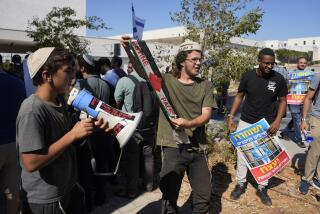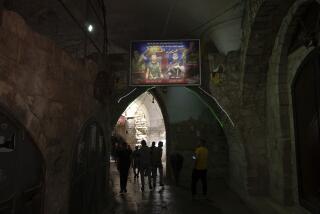Treason Case Stirs Furor in Israeli Legal Circles : Concerns Raised About Security Service’s Methods of Questioning Suspects
- Share via
JERUSALEM — Izat Nafsu’s Circassian ancestors were Muslims who left their home in the northern Caucasus Mountain region more than 100 years ago and settled in northern Galilee.
When the state of Israel secured its political independence in the 1948 Arab-Israeli War, the Galilee Circassians, despite their religion and background, sided with the Israelis. Their sons served in the Israeli army, mostly in front-line fighting units. They were always considered supremely loyal to the state.
Izat Nafsu, it seemed, was no exception--until the Israelis put him away for treason.
That happened, very quietly, in 1980.
But today, more than seven years later, Nafsu has emerged as the central figure in a cross-cultural scandal that has raised questions about the role of Israel’s Shin Bet security service in the jailing of thousands of Palestinians every year.
The case has shaken both the Shin Bet and the Israeli legal establishment. It recently inspired the country’s attorney general to propose controversial legal changes that would specifically allow the introduction as evidence, in certain cases, of confessions extracted by what have always been considered illegal or at least questionable methods.
Parts of Nafsu’s story have come to light now because of another recent change in Israeli law that enabled him to appeal his military-tribunal conviction to the Supreme Court. The scheduling of a hearing on his appeal for May 24 has triggered what the Israeli press described as a “panicky” reaction by the General Security Service, or Shin Bet, which has tried desperately to sidetrack the appeal.
Many details of the story are still blocked from publication by Israel’s military censors. But those that have emerged sound like something out of a spy novel. Nafsu’s primary accuser, for example, is a mysterious Lebanese informer code-named Abu Kassem, who is said to work not only for Israeli intelligence but also for the Syrians and several Lebanese militias.
Another key figure is Yossi Ginnosar, a former Shin Bet official who was forced out of his post last year after admittedly falsifying evidence in an inquiry into another scandal--in which Israeli agents beat to death two Palestinian prisoners they captured during an attempted bus hijacking. Ginnosar received a presidential pardon for his role in that earlier incident, which occurred in 1984 but came to light only last year.
Nafsu’s interrogation by the Shin Bet began at a five-star hotel, the name of which the censors will not allow to be published. Such treatment, the Israeli press has reported, is normally reserved for Jewish suspects.
Now that the affair is at least partly in the open, Shin Bet officials are pressing the government to free Nafsu and forget the whole business. But Nafsu--friends describe him as small but strong-willed--insists that his name be cleared completely.
Not Eager to Comment
The country’s top political leaders are not eager to comment on the case.
When a television interviewer asked Prime Minister Yitzhak Shamir about it recently, he replied, “A difficulty is involved, and I do not wish to detail the difficulties to those who would like nothing more than to increase them.”
According to information that the censor has allowed to be published, Nafsu’s story begins in the late 1970s, in southern Lebanon, where he was serving as an army lieutenant and was involved in contacts between the Israel Defense Forces and their Christian Lebanese allies.
“He saw a lot and knew a lot,” editor Nahum Barnea wrote in the weekly Koteret Rashit.
One of Nafsu’s contacts was Abu Kassem.
Nafsu left the service in October, 1979, under circumstances that are not clear. Some reports say he was tired, possibly depressed after an unhappy love affair. Others say that Rafael Eitan, then the chief of staff, was suspicious of him.
Nafsu returned to his home village of Kafr Kama in Galilee, started building a home and got married. On Jan. 4, 1980, he was arrested and, on the basis of a tip from Abu Kassem, accused of passing intelligence and military equipment to an unidentified enemy country, believed to be Syria.
His interrogation by the Shin Bet was relatively mild, according to Barnea’s account, in contrast to “the brutal treatment which is sometimes meted out to Arab suspects from the (Israeli-occupied) territories.”
Barnea added: “There may be some truth in the (Nafsu) family’s claim that he was given hot and cold showers and left to stand outside in his underwear on cold January nights. Yet, the major pressure was psychological. . . .”
Eventually, the investigators threatened to arrest Nafsu’s wife as well. Finally, after two weeks or so of this, Nafsu reportedly confessed.
At his secret trial before a military court, Nafsu denied the accusations against him and argued that his confession had been extracted illegally, according to Barnea’s account. Nafsu argued that other evidence against him had been fabricated. Abu Kassem was never called to testify.
The judges, Barnea said, “apparently” acting on “the assumption . . . that the GSS (Shin Bet) has no ulterior motive in bringing false charges against an IDF (army) officer,” found Nafsu guilty of treason and sentenced him to 18 years in prison.
A military appeals court rejected Nafsu’s argument that he had been framed.
But when the Knesset (Parliament) passed a law allowing military verdicts to be appealed to the Supreme Court, it gave Nafsu new hope. So did another development--testimony by Ginnosar in the hijacked bus incident that the Shin Bet had falsified evidence in other cases. Ginnosar, who, after leaving the security service, was appointed head of the Israel Export Institute, was the man who directed the Shin Bet team that originally investigated Nafsu.
In trying to block the appeal, Shin Bet officials have reportedly taken their case to Israel’s top political leadership. The security service has what is seen here as an enviable record of preventing terrorist attacks on the country, and the officials take the position that it must sometimes use questionable or even illegal methods to obtain vital information.
Testimony Unchallenged
Israeli courts, civilian and military, have traditionally accepted Shin Bet evidence with little or no question and accepted the argument that it must preserve secrecy surrounding its methods. The Jerusalem Post quoted “well-placed sources” as saying that many convictions of security prisoners are based “on the unchallenged testimonies of Shin Bet operatives.”
Thus, for the Supreme Court to take up the Nafsu appeal, even in secret, is seen here as breaking new ground and, as the Jerusalem Post put it, threatening “a rupture between the security service and the judicial system.”
Shin Bet officials have reportedly argued that the high court inquiry will unfairly make the agents who interrogated Nafsu “fall guys” for the whole system.
They have also warned that the action could lead to a flood of appeals from the estimated 4,000 Palestinians now in Israeli prisons for security offenses. About 90% of those prisoners confessed, according to Israeli officials.
At one point, according to the Israeli press, the head of Shin Bet, whose name is kept secret, told top Cabinet ministers that, as a last resort, Nafsu’s appeal should be preempted by ordering a full-scale commission of inquiry to review agency procedures. Presumably, such a commission’s findings would be secret.
Also, the agency was reportedly behind Atty. Gen. Yosef Harish’s proposal for changes in the evidence law. Harish is a political appointee unpopular with many senior Justice Ministry attorneys who work under him.
“It is a sinister proposal which originated inside the Shin Bet,” a high ranking Justice Ministry source said. “It is designed to allow the Shin Bet to extract confessions by illegal means.”
Knesset member Mordechai Virshubski said that if Harish and the head of Shin Bet really favor different legal standards for security service interrogations, then both are “unfit to serve in the public service of a democratic country.”
Yossi Sarid, a Knesset member from the leftist Citizens Rights Movement, called the idea “nightmarish.” He said that Shin Bet must conform to the law, and not the law to Shin Bet. But other lawmakers contend that the security agency should be given whatever tools it requires to continue what they see as its all-important battle against Israel’s enemies.
Present law requires that confessions, for admission as evidence, must be “free and voluntary.” The courts are admittedly not as strict in defining that guideline as their counterparts in the United States.
It is illegal to use physical force to extract a confession here, but what a top criminal attorney calls “tricks” are acceptable. For example, he said, it is considered permissible for an investigator to induce a suspect to confess by telling him, falsely, that another witness has already testified against him.
Palestinian sources say the Shin Bet routinely uses physical torture. Israeli officials say this is rare.
Other, apparently more common methods seem to fall into a legal gray area. These include depriving suspects of sleep, exposing them to temperature extremes, isolating them and sometimes leaving them with burlap sacks over their heads for long periods of time.
Editor Barnea commented in an interview: “I don’t believe that Nafsu was tortured, at least not badly. But the big thing is that thousands of people pass (through) Shin Bet (hands) every year. Palestinian Arabs, not Nafsu. They are mistreated--no doubt about it. How badly, I don’t know.
“Nafsu is maybe the tip of an iceberg, and what everybody is talking about now is not really Nafsu, but the whole policy of the ‘Shabak’ (Shin Bet) toward Palestinian suspects.”
More to Read
Sign up for Essential California
The most important California stories and recommendations in your inbox every morning.
You may occasionally receive promotional content from the Los Angeles Times.










